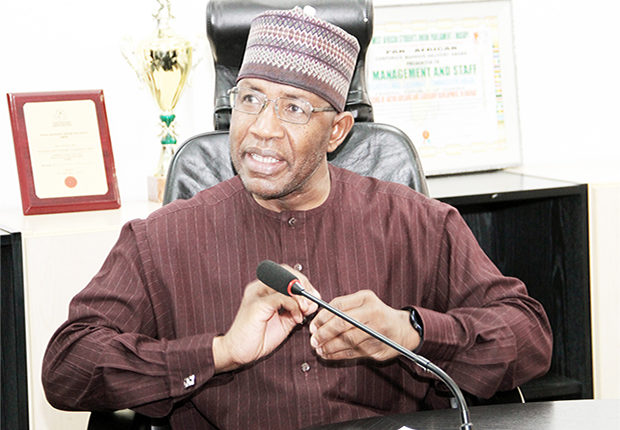The Director General, Securities & Exchange Commission (SEC), Mr. Lamido Yuguda has hinted that the $1 trillion economy target by President Bola Tinubu-led federal government is achievable through the capital market.
President Bola Tinubu recently said the Nigeria’s economy can grow to $1 trillion by 2026, adding that a $3 trillion Nigerian economy is possible in 10 years.
Speaking during the weekend to journalists on the side-line of the third meeting of the Capital Market Committee (CMC) in Lagos, Yuguda said, the commission is focusing on how to galvanise the capital market funds into infrastructure to enhance the realisation of the $1trillion economic target by 2026.
This plan, he stressed, would address the infrastructural deficit in the country by ensuring funding of critical infrastructure projects through the capital market, which is expected not only to provide a conducive operating environment for businesses, it also enhance the production capacity of Nigerians, thereby, soaring the nation’s economic growth and development.
He stated that Nigeria with over 200million has the potential to grow its economy, stressing that the youthful population serves as an additional advantage.
He noted concerns around the recent reclassifications of Nigerian securities indices by FTSE-Russell and MSCI, attributing these to the present foreign exchange liquidity challenges, and its effects on investor confidence.
He attributed the foreign investors’ exit in the capital market to foreign exchange scarcity, stating that domestic investors’ takeover can be linked to renewed confidence and improved corporate earnings by listed companies.
The DG of the capital market regulating body said the Commission is targeting increasing market capitalisation contribution to Gross Domestic Product (GDP) to 50 per cent.
According to him, “In other countries, market capitalisation contribution to GDP is over 300 per cent which means that the total value of all shares on the stock market is higher than the GDP.
“The less than 20 per cent market capitalisation contribution to GDP in Nigeria simply means there is low economic activity. There are a lot of companies that are traded in the private market. There are companies in Nigeria that have a higher turnover than many quoted companies on the market and are not listed.
“When you attract these companies to be listed on the market, you have increased your market capitalisation. The commission wanted to get these companies listed. Look at what impact BUA Foods has contributed to the stock market.
“Today, we can count so many big companies operating successfully in Nigeria but are not listed.”
He noted further that the commission is working with stakeholders, including these companies to be listed on Nigeria’s Exchanges in a move to expand market capitalisation to GDP by 50per cent.
Believing the market and investors’ literacy and public awareness are critical to mobilise more companies and investors to take advantage of opportunities offered by the capital market, he is optimistic that the foreign exchange crisis that is limiting the influence of foreign investors on the capital market would soon be resolved by the current administration.
Giving details of the recently concluded CMC meeting, he said, the meeting mandated SEC to enhance public awareness of the capital market’s benefits, expressing optimism that the envisioned one trillion-dollar economy could be realised, with the help of collaborative efforts and productive actions in the capital market.
Addressing the challenges posed by high-interest rates on government treasury securities, he stressed the need for strategic measures to attract more investments into the capital market.
Expressing optimism about unlocking the full potential of the capital market, aligning it with the Renewed Hope Agenda of the President Tinubu administration, he disclosed that, “the Chairperson of the Technical Committee on the Commodities Trading Ecosystem, Ms. Daisey Ekineh, informed the CMC about ongoing engagement with the Standards Organisation of Nigeria (SON) to secure approval of certain standards and the adoption of additional commodity standards sanctioned by the African Organisation for Standardisation (ARSO).”
“She highlighted other initiatives by the Technical Committee, with a particular focus on introducing commodity derivatives. Ms. Ekineh also highlighted other ongoing engagements, including efforts to work with the National Insurance Commission (NAICOM) to further de-risk the ecosystem by introducing insurance products that suit the needs of the commodities producers and traders,” he added.
In conclusion, he said, the meeting underscored the Capital Market Committee’s dedication to propelling Nigeria’s economic growth, fostering collaboration, and embracing innovation to build a greater future for the nation as it once again offered the capital market community an opportunity to rededicate its efforts towards further deepening of the market to serve as a veritable tool for infrastructure financing in the country.



















